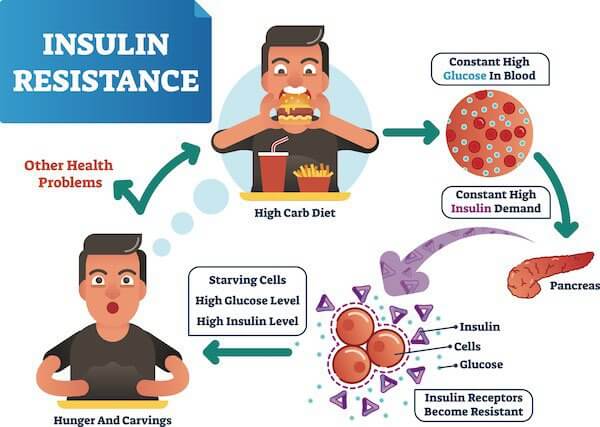
Insulin Resistance: What is it and how is it contributing to your symptoms?
- Cravings for sugar
- Fatigue after meals
- Migrating aches and pains
- Upper abdominal obesity
- High cholesterol and triglycerides
- Acne
- Facial hair
- Low thyroid function
- Constant hunger
- Inability to lose weight
If this sounds like you, it may be due to fluctuating insulin and blood sugar levels. Insulin is a hormone that moves glucose (or sugar) into the cells of our body after we eat. This sugar is then either used as a fuel source or stored as fat in the body.
After a meal, our blood sugar rises and insulin is released to move the sugar out of the blood and into the cells. Then insulin levels and blood sugar levels slowly begin to decrease. Sometimes, our bodies may become less sensitive to insulin; this means that more insulin is needed in order to move sugar into the cells. This insulin resistance is one of the first signs of blood sugar dysregulation, and when left unmanaged, this can lead to chronic inflammation, trouble losing weight, obesity, cardiovascular disease, and Type 2 diabetes.
Insulin resistance is estimated to be prevalent in about 15.5 to 46.5% of adults worldwide. To test for insulin resistance, your physician may order specific lab tests or an "Insulin Glucose Challenge Test." This test helps to see the patterns of insulin and glucose spikes that are occurring in your body after consuming sugar and whether or not the patterns are normal.

The good news is insulin resistance can be reversible. Some treatment options for insulin resistance may include:
- Fasting to create a period of time where insulin is not around in the blood to break the pattern of irregular insulin spiking.
- Modifying the diet by reducing how many insulin stimulating foods you are consuming.
- Increasing consumption of foods with polyphenolic compounds (ex. Berries).
- Fiber
- Stress reduction
- Berberine, an antimicrobial herb that has been shown to reduce glucose, insulin and lipid levels through modulation of the gut microbiome.

However, it is important to note that none of this information should be interpreted as medical advice; there are a number of factors that may be contributing to insulin resistance such as, poor nutrition, poor sleep, poor gut health etc. Treatment needs to be specific and targeted to your individual results and needs. The most effective way to treat insulin resistance is to work with your healthcare provider, complete specific lab work, understand and identify the key factors contributing to insulin resistance and follow a customized plan that meets you where you are at.
Naturopathic Medicine at Phoenix Physio Clinic
Dr. Sarah Capetola, ND sees a variety of conditions, including: allergies, anxiety, arthritis, autoimmune conditions, depression, fibromyalgia, fertility support, gout, hypertension, high cholesterol, fatty liver, insomnia, immune support, migraines, stress management, chronic UTI and obesity.
It allows you to go back to doing what you love! Make sure you mention this article when you CALL (905) 832-1110 .


The Gut - Brain Connection
Did you know that the brain and gut are directly connected? The brain can send signals down to the intestines and the intestines can send signals back to the brain. The brain and gut are directly connected by the vagus nerve and indirectly connected by chemical messengers that are sent between the gut and brain.

Are Your Hormones Imbalanced?
Hormones are chemical messengers in your body; they are produced in the endocrine glands and travel in your bloodstream to your tissues and organs to tell them what to do. Hormones play an important part in your overall health and contribute to your mood, appetite, and weight. Normally, hormone levels can fluctuate from day to day. Hormones also fluctuate as a result of the natural aging process. However, there can sometimes be too little or too much hormone produced in the body which can have a serious effect on your physical, mental and emotional health.

Working with a Naturopathic Doctor
The goal of a naturopathic doctor is to listen to your health concerns and give you the support you need in order to feel better. Naturopathic Doctors complete comprehensive investigations to identify the root cause of your symptoms which may include ordering laboratory and functional testing directly through Life Labs in order to properly diagnose and monitor your health. By understanding what is happening inside the body, naturopathic doctors can then customize a diet, lifestyle and supplement plan that works for you to help you feel better.

